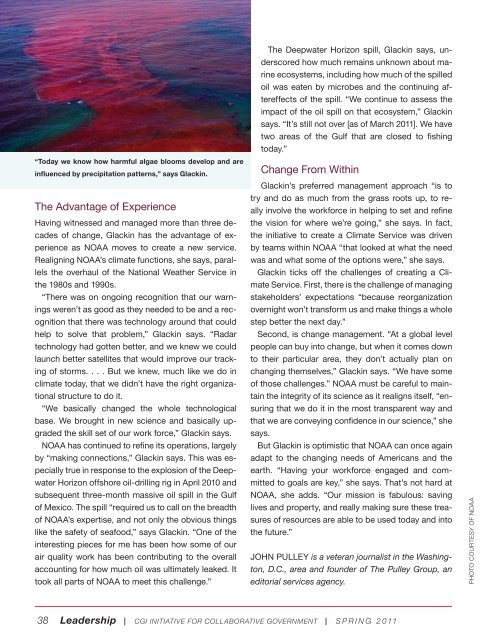Government's Sustainability Moment - CGI Initiative for Collaborative ...
Government's Sustainability Moment - CGI Initiative for Collaborative ...
Government's Sustainability Moment - CGI Initiative for Collaborative ...
Create successful ePaper yourself
Turn your PDF publications into a flip-book with our unique Google optimized e-Paper software.
“Today we know how harmful algae blooms develop and areinfluenced by precipitation patterns,” says Glackin.The Advantage of ExperienceHaving witnessed and managed more than three decadesof change, Glackin has the advantage of experienceas NOAA moves to create a new service.Realigning NOAA’s climate functions, she says, parallelsthe overhaul of the National Weather Service inthe 1980s and 1990s.“There was on ongoing recognition that our warningsweren’t as good as they needed to be and a recognitionthat there was technology around that couldhelp to solve that problem,” Glackin says. “Radartechnology had gotten better, and we knew we couldlaunch better satellites that would improve our trackingof storms. . . . But we knew, much like we do inclimate today, that we didn’t have the right organizationalstructure to do it.“We basically changed the whole technologicalbase. We brought in new science and basically upgradedthe skill set of our work <strong>for</strong>ce,” Glackin says.NOAA has continued to refine its operations, largelyby “making connections,” Glackin says. This was especiallytrue in response to the explosion of the DeepwaterHorizon offshore oil-drilling rig in April 2010 andsubsequent three-month massive oil spill in the Gulfof Mexico. The spill “required us to call on the breadthof NOAA’s expertise, and not only the obvious thingslike the safety of seafood,” says Glackin. “One of theinteresting pieces <strong>for</strong> me has been how some of ourair quality work has been contributing to the overallaccounting <strong>for</strong> how much oil was ultimately leaked. Ittook all parts of NOAA to meet this challenge.”The Deepwater Horizon spill, Glackin says, underscoredhow much remains unknown about marineecosystems, including how much of the spilledoil was eaten by microbes and the continuing aftereffectsof the spill. “We continue to assess theimpact of the oil spill on that ecosystem,” Glackinsays. “It’s still not over [as of March 2011]. We havetwo areas of the Gulf that are closed to fishingtoday.”Change From WithinGlackin’s preferred management approach “is totry and do as much from the grass roots up, to reallyinvolve the work<strong>for</strong>ce in helping to set and refinethe vision <strong>for</strong> where we’re going,” she says. In fact,the initiative to create a Climate Service was drivenby teams within NOAA “that looked at what the needwas and what some of the options were,” she says.Glackin ticks off the challenges of creating a ClimateService. First, there is the challenge of managingstakeholders’ expectations “because reorganizationovernight won’t trans<strong>for</strong>m us and make things a wholestep better the next day.”Second, is change management. “At a global levelpeople can buy into change, but when it comes downto their particular area, they don’t actually plan onchanging themselves,” Glackin says. “We have someof those challenges.” NOAA must be careful to maintainthe integrity of its science as it realigns itself, “ensuringthat we do it in the most transparent way andthat we are conveying confidence in our science,” shesays.But Glackin is optimistic that NOAA can once againadapt to the changing needs of Americans and theearth. “Having your work<strong>for</strong>ce engaged and committedto goals are key,” she says. That’s not hard atNOAA, she adds. “Our mission is fabulous: savinglives and property, and really making sure these treasuresof resources are able to be used today and intothe future.”John Pulley is a veteran journalist in the Washington,D.C., area and founder of The Pulley Group, aneditorial services agency.PHOTO COURTESY OF NOAA38 Leadership | <strong>CGI</strong> INITIATIVE FOR COLLABORATIVE GOVERNMENT | S P R I N G 2 0 11


